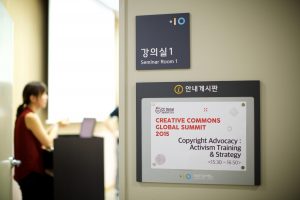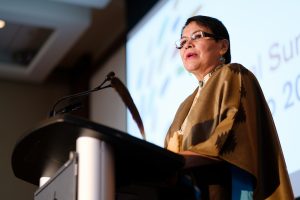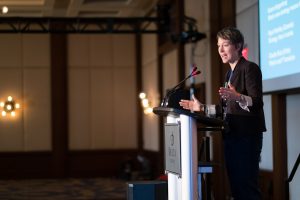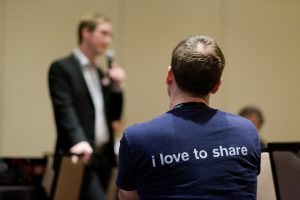[Creative Commons, Link (CC-BY)] The Call for Proposals for the Creative Commons Global Summit is now open! The deadline for submissions is January 23, 2018 at 11:59PM in the submitter’s timezone.
The Creative Commons Global Summit (CC Summit) is an annual conference that celebrates the culture of sharing, providing a space for open communities to collectively grow a vibrant, usable commons, powered by collaboration and gratitude.
Table of Contents
1. Call for Proposals is Now Open
2. Submission Guide
3. On Common Ground: Collaborate and Participate
4. Call for Proposals Deadline
5. Target Audiences
6. Summit Theme
7. Summit Goals
8. Tracks and Categories
9. Funding for Presenters
10. How to Submit Your Proposal
Call for Proposals is Now Open
The online Call for Proposals form for the 2018 Global Summit is now open!
Submission Guide
We have created a downloadable PDF Submission Guide to help you prepare the best possible submission for your proposal. The Submission Guide is an offline version of the online Call for Proposals form, and contains the exact questions you will be asked, including the character count limitations for your answers. We recommend reviewing the information in the Submission Guide prior to completing the online Call for Proposals form.
On Common Ground: Collaborate and Participate

The Creative Commons Global Summit (CC Summit) is an annual meeting that celebrates the culture of sharing, and provides a space for open communities to collectively grow a vibrant, usable commons, powered by collaboration and gratitude. The 2018 CC Global Summit builds on a new chapter envisioned for Creative Commons as a renewed, strong, and growing network, and as part of the global open movement.
This year’s Summit will provide a diverse and fun space for everyone to collaborate and be a part of the CC community and the future of the Commons. We will lay the groundwork that will provide us with a solid foundation for the shared, collaborative, and participatory community that we want to build and is needed for our movement to diversify and thrive. We hope you will join us.
Call for Proposals Deadline
The deadline to submit a proposal is January 23, 2018, at 11:59pm in the submitter’s timezone.
Target Audiences

The CC Summit is open to everyone who is interested and we always welcome new faces and fresh ideas. If you are wondering if you should attend CC Summit or submit a proposal, it may be helpful to know our target audiences.
- Active members of the CC network (e.g., CC network members, CC country teams)
- Members of partner organizations (e.g., Mozilla, Wikimedia, Open Knowledge, etc.)
- Creators and users working with open licenses (e.g., artists, educators, researchers, librarians)
- Activists working on open access to information (e.g., lawyers, journalists)
- Representatives of funding organizations (e.g., foundations, governments)
- Potential members for any of the above (e.g., an organization or individual whose work or values align with CC but is not yet actively engaged in the movement)
- Open technology enthusiasts which contribute to the values of open through decentralized technologies (e.g., blockchain.)
Summit Theme
The theme of the 2018 Global Summit is “On Common Ground: Collaborate and Participate.” In the online application, you will be asked to explain how your proposal addresses this theme.
Summit Goals
Your session should align with at least one of the Summit goals:
GOAL #1: Understand the CC community and the new CC Network structure
- Who are we, and how do we grow and diversify our movement?
- The new CC Network structure.
- Participating in the CC community: collaborators, members and partners, country chapters, CC platforms and working groups.
- Who are we and who are we missing? Which countries? Are we as diverse and inclusive as we seek to be? Who else should we invite to the CC community and Network? What kinds of infrastructure / mechanisms should we build to be more welcoming?

GOAL #2: Leverage the power of the CC Network through inclusive and diverse participation: shared objectives, collaboration, and communication.
- What do we want to achieve, what will we do to achieve it, how will we do it, and with whom? How do we create safe spaces, in our incredibly diverse and growing community, for learning, adaptation, and growth? How can we support and celebrate the creation and sharing of knowledge by all people, and ensure it is technically and legally accessible for everyone?
- Shared objectives: what do we want to achieve together?
- Collaboration: discuss and plan for how the CC community will work together through platforms, working groups, and international cross-country chapter projects.
- Communication: providing skills, tools, insights, and access to people and organizations to enable participation and doing things together (communications, funding, common interests, etc.)
Tracks and Categories

The Summit will be organized by “Tracks” (topics) and “Categories” (session focus). Each session must be aligned with at least one track and one category, in addition to aligning with the Summit theme and goal(s).
TRACKS (topics):
- “CC Global Network”
CC Network updates, how to join, fundraising, country chapters, governance, etc. - “Legal and Copyright Reform”
Future of CC licenses, copyright reform, trademark, traditional knowledge, etc. - “Open Education (OE) and Open Access (OA)”
OE and OA content, policies and practices; new business and procurement models, culture shifts, etc. - “Galleries, Libraries, Archives and Museums (GLAM)”
Case studies, policies and practices; how can CC and GLAM institutions work together; etc. - “User-Centered Commons”
Usability is both enhancing the experience of sharing and collaborating with CC’s current toolset, and conceiving of new tools and features that unlock creativity and knowledge content. - “CC and New Technologies”
What existing and emerging technologies will change the Commons? What should we be investigating, testing, implementing to meet our goals? - “Future of the Commons”
What future do we want to build together? How can multiple open movements act collectively to solve shared goals? How do we stay committed to Open as new commercial players enter the space?
CATEGORIES (session focus):
- “Collaboration, Communication, & Community”
Working together; community; identifying shared goals and insights; expanding active networks; how to contribute and collaborate; how to work with partners; who is missing; working groups; affiliates; chapters; inclusivity in communications & collaboration; effective communications; effective collaboration. - “Skills & Training”
Sharing and learning tools, skills, hard-knowledge, technical know-how, guides, practical advice, intros/101s; level-up workshops. Also, communication tools workshops for members to learn, hands-on, how to create and maintain a CC country chapter website and improve long-distance collaboration and communication. - “Strategy, Policy, & Advocacy”
What does CC want to achieve; how will we get there; building on lessons learned; opportunities & challenges ahead. This includes “in the weeds” discussions; legal strategies; share technical & topical expertise; political contexts; campaigning & public messaging; specialized intel / insights; nitty gritty of how to achieve goals & advocate in specific regions / contexts. - “Governance & Infrastructure”
Chapter / group / affiliate management & governance; sustainable leadership & group structure; fundraising / funding; CC Global Network.
Funding for Presenters
While scholarships are one of the single largest investments we make in the summit — nearly 1/3 the cost of the event — CC has limited funds to offer compared to the size of the community and need for support. We prioritize participation of contributing community members, but recognize that some who wish to present will require subsidy. The online Call for Proposals form asks potential presenters to indicate if a) they have applied for a scholarship and b) if funding is a determining factor in their acceptance of a presentation opportunity.
We will be offering the first round of scholarships as planned in late January. However, we always offer a second round to applicants and will use that opportunity to co-ordinate against those who are being considered to present sessions. Session applicants don’t have to apply separately for scholarships, but scholarship applicants get priority. In 2019, we will consider a separate subsidy pool for presenters.
How to Submit Your Proposal
To submit a proposal, first read the information in the Submission Guide. Then, complete the online Call for Proposals form.




